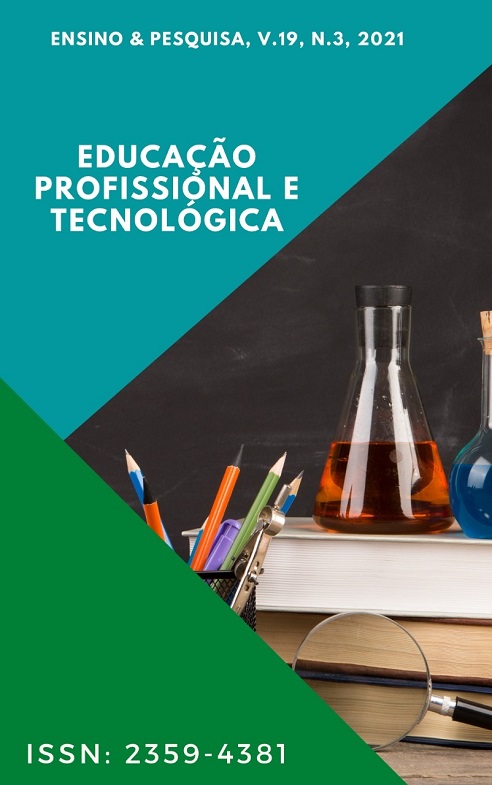Scientific practices in science education: a systematic review of research characteristics and trends
DOI:
https://doi.org/10.33871/23594381.2021.19.3.203-219Resumo
Interest in research involving Scientific Practices has increased in recent years due to the importance given to the term in recente Science Education standards. This research presents results of a Systematic Review of articles involving Scientific Practices in Science Education. 44 articles from journals published in the last ten years (2010-2019) were analyzed from four databases: ERIC, Scielo, Scopus and Web of Science. The objectives were: I) To identify publications involving Scientific Practices in Science Education; II) To synthesize the characteristics of these publications; and III) To critically analyze research trends. For this, a qualitative investigation was carried out guided by Bardin's Content Analysis (2011) and Okoli's guide to a Systematic Review (2015). As a result it was identified that 26 articles (59.1%) were from North America and 18 (40.9%) from other countries in Europe, South America, Asia, Oceania, and Africa, thus characterizing Scientific Practices as a topic of international repercussion. The increase in research involving Scientific Practices, as seen in 89% of the studies which were published in the second half of the last decade, can be justified due to: 1) The impact of guiding documents which present great emphasis on Scientific Practices; and 2) The preference of some studies to use the concept of three-dimensional learning instead of "inquiry" . Among the most cited references, are the NRC (2012) and NGSS (2013) in 67.6% and 45.9% of the articles, respectively. Research gaps in Scientific Practices are also identified, such as a need for more research with a central focus on the theme, and research that investigates pre-service teacher education. Research in this context is relevant, since Science teaching supported by Scientific Practices is more easily promoted with intentional instruction in the initial training of teachers.Downloads
Referências
BERLAND, L.K.; SCHWARZ, C.V.; KRIST, C.; KENYON, L.; LO, A.S.; REISER, B. Epistemologies in practice: Making scientific practices meaningful for students. Journal of Research in Science Teaching, v. 53, n. 7, p. 1082–1112, 2016.
BROIETTI, F. C. D.; NORA, P. S.; COSTA, S. L. R. Dimensions of Science Learning: a study on PISA test questions involving chemistry content. Acta Scientiae, v. 21, n. 1, p. 95-115, 2019.
BYBEE, R. Scientific and engineering practices in K-12 classrooms. The Science Teacher, v. 78, n. 9, p. 34-40, 2011.
COSTA, S. L. R.; OBARA, C. E.; BROIETTI, F. C. D. Critical thinking in Science education and Mathematics education: research trends of 2010-2019. Research Society and Development, v. 9, n. 9, p. 1-30, 2020a.
COSTA, S. L. R.; OBARA, C. E.; BROIETTI, F. C. D. Critical Thinking in Science Education Publications: the Research Contexts. International Journal of Development Research, v. 10, n. 8, p. 39438-39448. 2020b.
DUSCHL, R. A.; BYBEE, R. W. Planning and carrying out investigations: An entry to learning and to teacher professional development around NGSS science and engineering practices. International Journal of STEM Education, v. 1, n. 1, p. 1-9, 2014.
EBERBACH, C.; CROWLEY, K. From everyday to scientific observation: How children learn to observe the biologist"™s world. Review of Educational Research, v. 79, n. 1, p. 39-68, 2009.
FINK, A. Conducting research literature reviews: From the Internet to paper. 2 ed. Thousand Oaks, Estados unidos: Sage, 2005.
FORD, M. Disciplinary authority and accountability in scientific practice and learning. Science Education, v. 92, n. 3, p. 404-423, 2008.
KELLY, G. J. Inquiry, activity, and epistemic practice. In: R. DUSCHL, R.; GRANDY, R. (Eds.). Teaching scientific inquiry: Recommendations for research and implementation. Rotterdam: Sense Publishers, 2008.
LATOUR, B.; WOOLGAR, S. Laboratory life: The construction of scientific facts. Princeton, Estados Unidos: Princeton University Press, 1986.
MINNER, D. D.; LEVY, A. J.; CENTURY, J. Inquiry-based science instruction"”what is it and does it matter? Results from a research synthesis years 1984 to 2002. Journal of Research in Science Teaching, v. 47, p. 474–496, 2010.
National Research Council. Taking science to school: Learning and teaching science in grades K-8. Washington, Estados Unidos: National Academies Press, 2007.
National Research Council. National Science Education Standards. Washington, DC: National Academy Press, 1996.
NRC - NATIONAL RESEARCH COUNCIL. A Framework for K-12 Science Education: Practices, Crosscutting Concepts, and Core Ideas. Committee on Conceptual Framework for the New K-12 Science Education Standards, 2012. 385p. Disponível em: <http://www.nap.edu/catalog/13165/a-framework-for-k-12-science-educationpracticescrosscutting-concepts>. Acesso em: 23 abr. 2019.
NGSS Lead States. Next generation science standards: For states, by states. Washington, DC, Estados Unidos: The National Academy Press, 2013.
NTSA - National Science Teaching Association. K–12 Science Standards Adoption. National Science Teaching Association. Disponível em: < https://ngss.nsta.org/About.aspx>. Acesso em: 23 abr. 2019.
OKOLI, C. A Guide to Conducting a Standalone Systematic Literature Review. Communications of the Association for Information Systems, v. 37, n. 43, p. 879 – 910, 2015.
OSBORNE, J. Teaching scientific practices: meeting the challenge of change. Journal of Science Teacher Education, v. 25, n. 2, p. 177–196, 2014.
PRINS, G. T.; BULTE, A. M. W.; VAN DRIEL, J. H.; PILOT, A. Students"™ involvement in authentic modelling practices as contexts in chemistry education. Research in Science Education, v. 39, n. 5, p. 681–700, 2009.
SCHWARZ, C. V.; REISER, B. J.; DAVIS, E. A.; KENYON, L.; ACHÉR, A.; FORTUS, D.; SHWARTZ, Y.; HUG, B.; KRAJCIK, J. Developing a learning progression for scientific modeling: Making scientific modeling accessible and meaningful for learners. Journal of Research in Science Teaching, v. 46, n. 6, p. 632–654, 2009.
SOUSA, A. S.; VIEIRA, R. M. O pensamento crítico na educação em Ciências: revisão de estudos no Ensino Básico em Portugal. Revista da Faculdade de Educação, v. 29, n. 1, p. 15-33, 2019.
WHITE, B.Y.; FREDERIKSEN, J. R. Inquiry, modeling, and metacognition: Making science accessible to all students. Cognition and Instruction, v. 16, n. 1, p. 3–118, 1998.
WINDSCHITL, M.; THOMPSON, J.; BRAATEN, M. Beyond the scientific method: Model"based inquiry as a new paradigm of preference for school science investigations. Science Education, v. 92, n. 5, p. 941-967, 2008.

